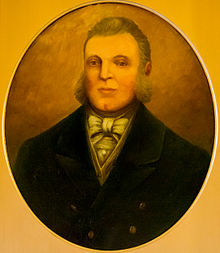Arthur Fenner
Arthur Fenner (born December 10, 1745 in Providence , Colony of Rhode Island and Providence Plantations , † October 15, 1805 ibid) was an American politician and governor of the state of Rhode Island from 1790 to 1805 .
Early years
Arthur Fenner was a successful businessman. For many years he was a record clerk at a Providence Court of Appeals. Politically, he was an opponent of the Federalist Party . Like many of his countrymen, he was against a strong federal government. In opposition to the federalists, the so-called Country Party arose in Rhode Island , which Fenner joined.
Governor of Rhode Island
In 1790, resistance to the United States Constitution peaked in Rhode Island. The then governor, John Collins , was voted out of office because he had voted to convene a convention to ratify the constitution. As the Country Party candidate, Arthur Fenner was elected to succeed him. He was very popular in Rhode Island and was confirmed in office in the following years. He was able to exercise this office from May 5, 1790 until his death on October 15, 1805.
The opposition to the constitution was so strong that the vote had to be postponed until the end of May 1790. On May 29, Rhode Island became the last of the 13 founding states to ratify the US Constitution by 34 votes to 32. During Fenner's 15-year tenure, a Society for the Abolition of Slavery was founded in Providence . The procedures for electing MPs for the United States Congress and Senators for the US Senate were established. The American currency was also introduced. Governor Fenner died in October 1805. He and his wife Amey Comstock had four children, including their son James , who was to become Governor of Rhode Island several times between 1807 and 1845.
literature
- Robert Sobel and John Raimo (Eds.): Biographical Directory of the Governors of the United States, 1789–1978. Volume 4, Meckler Books, Westport, 1978. 4 volumes.
Web links
- Arthur Fenner in the National Governors Association (English)
- Arthur Fenner in the database of Find a Grave (English)
| personal data | |
|---|---|
| SURNAME | Fenner, Arthur |
| BRIEF DESCRIPTION | American politician |
| DATE OF BIRTH | December 10, 1745 |
| PLACE OF BIRTH | Providence , Rhode Island |
| DATE OF DEATH | October 15, 1805 |
| Place of death | Providence , Rhode Island |

